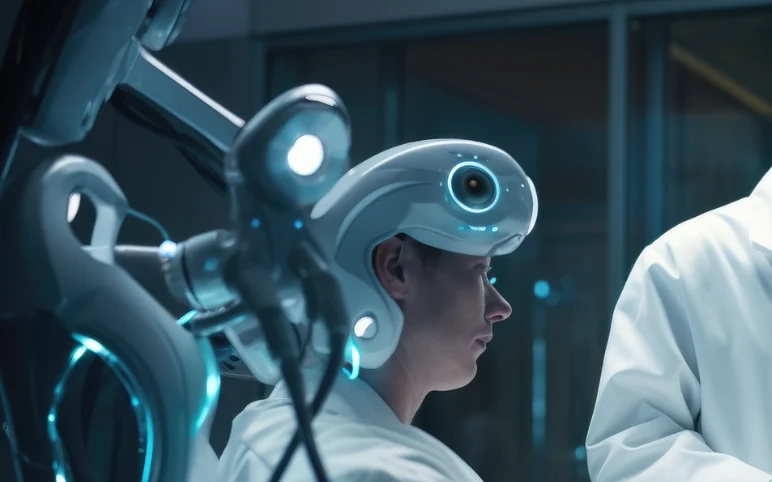Navigating the Evolving Landscape of Pharmacy Automation Solutions
Feb 28, 2024
Table of Contents
Pharmacy Automation Systems represent a pivotal advancement in healthcare technology, revolutionizing the way medications are dispensed, managed, and administered. Over the years, these systems have evolved from rudimentary pill counters to sophisticated robotic dispensers and integrated software platforms. Moreover, the advancements in new-age technologies such as robotics, artificial intelligence, and digital health solutions are further propelling the Pharmacy Automation Solutions market landscape. Pharmacy Automation products and solutions hold the potential to tackle complex healthcare challenges by streamlining medication dispensing processes, reducing medication errors, and optimizing inventory management. Moreover, they play a crucial role in facilitating medication reconciliation, ensuring compliance with regulatory standards, and improving overall operational efficiency in pharmacies and healthcare facilities.
As per the latest assessment by DelveInsight, the global Pharmacy Automation Systems market has experienced significant growth, fueled by the increasing demand for the filling of prescription drugs, rising cases of medication errors around the globe, the rising prevalence of chronic diseases, decentralization of pharmacies, enhanced patient safety, among others. Similarly, companies operating in the Pharmacy Automation Systems market have been instrumental in driving innovation, developing tailored solutions to meet the diverse needs of healthcare providers, and fostering collaborations to integrate these systems seamlessly into existing workflows. As the healthcare landscape continues to evolve, Pharmacy Automation Systems are poised to play a significant role in enhancing patient care outcomes and driving efficiency across the healthcare segment in the upcoming years.
Downloads
Click Here To Get the Article in PDF
Recent Articles
- Stryker’s Tornier Shoulder Arthroplasty; Genesis Acquires JC Medical; FDA Clearance to Single-Use...
- Enovis Acquires Novastep; Rockwell Medical Announced Collaboration with B. Braun; Dexcom G7 Recei...
- Wireless Brain Sensors: Revolutionizing Neuroscience and Healthcare
- MedTech Industry: Commercial, Regulatory and Clinical Updates
- Glowing Prospects: Energy-Based Aesthetic Devices Market Outlook
What are the Key Benefits and Applications of the Pharmacy Automation Solutions?
Pharmacy Automation Systems have become indispensable tools in modern healthcare, utilizing cutting-edge technology to perform a myriad of complex tasks with precision and efficiency. The applications of Pharmacy Automation Systems span across various healthcare settings, including retail pharmacies, hospitals, long-term care facilities, and specialty pharmacies, among others. Evolving applications include medication adherence monitoring, telepharmacy services, and personalized medication packaging, reflecting a growing emphasis on patient-centered care and healthcare innovation. As the healthcare landscape continues to evolve, Pharmacy Automation Systems are adapting to meet emerging needs and challenges. Through the integration of robotics, artificial intelligence, and sophisticated software, these systems have revolutionized medication management, dispensing, and inventory control processes.
One of the primary benefits of Pharmacy Automation Systems is their ability to significantly reduce medication errors, ensuring patient safety and minimizing adverse drug events. Moreover, these systems streamline workflow processes, saving valuable time for pharmacists and healthcare professionals, while also optimizing inventory management and reducing operational costs. As such, Pharmacy Automation Systems are poised to play an increasingly integral role in improving medication management processes, enhancing patient care outcomes, and driving efficiency across the healthcare continuum.
Major Types of Pharmacy Automation Systems in the Market
Various types of Pharmacy Automation Systems are available in the market and streamline medication management processes, enhance accuracy, and improve operational efficiency in pharmacies and healthcare facilities. Some of the major tools and products in the Pharmacy Automation Systems Market include:
Automated Dispensing Systems: These systems are designed to streamline the medication dispensing process in pharmacies and healthcare facilities by automating the counting, sorting, and labeling of medications. Automated dispensing systems play a crucial role in ensuring patient safety, optimizing inventory management, and freeing up pharmacists’ time to focus on clinical tasks. Automated Dispensing Systems improve accuracy, enhance efficiency, and reduce medication errors. They can be implemented in segments such as retail pharmacies, hospitals, long-term care facilities, and outpatient clinics.
Automated Packaging and Labeling Systems: These systems automate the packaging and labeling of medications, ensuring precise dosing and proper identification of medications for patients. They offer benefits such as increased efficiency, reduced packaging errors, and enhanced medication adherence. Automated packaging and labeling systems play a vital role in improving medication safety, compliance with regulatory requirements, and patient satisfaction. Automated Packaging and Labeling Systems are commonly used in centralized pharmacies, mail-order pharmacies and medication repackaging facilities.
Automated Table-top Counters: These systems automate the process of counting and dispensing medications in pharmacies and healthcare settings. They offer benefits such as accuracy, speed, and efficiency, particularly for high-volume medications. Automated table-top counters can reduce dispensing errors, improve workflow efficiency, and enhance medication management processes. Automated Table-top Counters find applications in segments such as retail pharmacies, hospital pharmacies, and compounding pharmacies.
Automated Storage and Retrieval Systems: These systems automate the storage, retrieval, and management of medications and medical supplies in pharmacies and healthcare facilities. They utilize robotic technology and computerized inventory management systems to efficiently store and retrieve items as needed. Automated storage and retrieval systems hold the potential for space optimization, inventory tracking, and error reduction. Moreover, they can improve medication safety, inventory management, and operational efficiency in pharmacies and healthcare settings.
In addition to the mentioned systems, there are various other automation solutions tailored to specific pharmacy needs. These may include medication compounding robots, prescription verification systems, prescription filling robots, and medication management software. Each of these systems serves to automate and optimize specific aspects of the pharmacy workflow, ultimately contributing to improved patient care, medication safety, and operational efficiency.
Pharmacy Automation Systems Market Drivers and Key Growth Factors
The increasing demand for specialized medication prescription filling solutions and the imperative to mitigate medication errors are the two factors leading to the expansion of the Pharmacy Automation Systems market. With the rise in chronic and life-threatening diseases and illnesses worldwide, the utilization of medications for diverse therapeutic indications is expected to surge significantly. This trend reflects not only the growing burden of disease but also the advances in medical science and healthcare delivery that have expanded treatment options for patients. As the demand for pharmaceutical interventions continues to escalate, there is a pressing need for robust medication management solutions that can effectively fulfill various needs.
The growing demand for enhanced patient safety and medication adherence has underscored the importance of implementing automated systems capable of minimizing errors throughout the medication dispensing process. According to the British Medical Journal (June 2021), approximately 237 million pharmaceutical errors are estimated to take place within the NHS in England annually, contributing to a significant number of avoidable adverse drug reactions (ADRs) and resulting in numerous fatalities. As healthcare providers strive to optimize operational efficiency and improve patient outcomes, the adoption of Pharmacy Automation Systems emerges as a strategic imperative, driving sustained market growth and innovation.
Likewise, with the evolution in technology and to fulfill the rising demand, healthcare institutions such as hospitals and pharmacies are increasingly adopting cutting-edge pharmacy automation technology. This strategic move is driven not only by the imperative to contain costs but also by the commitment to elevate patient safety standards. By leveraging innovative automation solutions, these facilities aim to optimize their operational efficiency, streamline medication management processes, and mitigate the risks associated with manual medication dispensing. Moreover, the integration of advanced technology enables healthcare providers to allocate more resources toward delivering high-quality patient care while minimizing the likelihood of medication errors and adverse drug events.
Furthermore, advancements within the Pharmacy Automation Systems market, including recent product introductions and a surge in funding and investment for research and development of new technologies, are anticipated to significantly drive growth. These developments are leading to a dynamic landscape characterized by continuous innovation and strategic investments aimed at enhancing the efficacy and scope of pharmacy automation solutions. The introduction of novel products equipped with advanced features and functionalities promises to address evolving healthcare needs more comprehensively, thereby bolstering the adoption of Pharmacy Automation Systems across various healthcare settings. Additionally, increased investment in research and development initiatives signals a commitment to exploring emerging technologies and refining existing solutions to better meet the evolving demands of the healthcare industry. This concerted effort towards innovation is poised to not only drive market growth but also foster the development of more sophisticated and tailored automation systems that can effectively address the diverse challenges and opportunities within the pharmacy domain.
Pharmacy Automation Systems Market Barriers
Despite the promising outlook for the Pharmacy Automation Systems market, certain barriers and challenges are hampering the growth trajectory. Some of the key factors such as apprehension surrounding the integration of automation systems into existing pharmacy workflows, concerns regarding the potential risks of cross-contamination, and uncertainties regarding regulatory compliance pose significant obstacles. Additionally, the upfront costs associated with implementing pharmacy automation solutions and the need for comprehensive training and support for healthcare professionals may deter some healthcare institutions from adopting these technologies.
Furthermore, the complexity of interoperability issues and the potential for disruptions in workflow efficiency during the transition phase could also hinder widespread adoption. Addressing these challenges will require concerted efforts from industry stakeholders, including robust risk mitigation strategies, enhanced regulatory guidance, and comprehensive education and training programs to instill confidence among healthcare providers. Despite these challenges, proactive measures and innovative solutions can overcome these hurdles and can ultimately pave the way for the broader adoption and acceptance of Pharmacy Automation Systems.
Growing Role of Companies and Startups in the Pharmacy Automation Systems Market
Companies play a pivotal role in driving innovation, addressing unmet needs, and overcoming existing challenges in the pharmacy market. Some of the key players in the global Pharmacy Automation Systems Market include Accu-Chart Plus Healthcare System Inc., AlixaR, ARxIUM, BD, Capsa Healthcare, McKesson Corporation, Newlcon, Omnicell Inc., Oracle, Parata Systems LLC, Pearson Medical Technologies, Rxsafe LLC, Scriptpro LLC, Swisslog Holdings AG, yuyama, and others. These players continuously invest in research and development activities to devise new solutions that not only enhance medication management processes but also cater to evolving healthcare demands. Moreover, companies are actively leveraging technology, such as artificial intelligence, robotics, and data analytics, to develop sophisticated automation systems capable of performing complex tasks with unparalleled accuracy and efficiency. In addition, they focus on integrating these systems seamlessly into existing pharmacy workflows to maximize their impact on patient care and operational efficiency.

Furthermore, in recent years, the Pharmacy Automation Systems market has witnessed the entry of several innovative startups, bringing fresh perspectives and disruptive technologies to the forefront. These startups capitalize on niche market opportunities, agile development processes, and a customer-centric approach to challenge established players and introduce novel solutions that address specific pain points in medication management. The active involvement of companies, both established players and startups, fuels competition, fosters innovation, and drives continuous improvement in Pharmacy Automation Systems, ultimately benefiting patients, healthcare providers, and the healthcare industry as a whole.
In the quest to outperform competitors and dominate the market, companies are actively engaged in strategic collaborations, mergers and acquisitions to expand their product portfolios and market reach. As an example, on October 03, 2023, Plenful, a platform specializing in workflow automation for pharmacy and healthcare operations, disclosed a $9 million funding round led by Bessemer Venture Partners. This funding was accompanied by the support of over 20 enterprise clients from health systems and pharmacies. Similarly, in June 2022, RedSail Technologies, LLC finalized the acquisition of TransactRx, LLC, a transaction platform facilitating billing for pharmacy and medical benefits. This strategic move involves the full integration of TransactRx’s platforms into RedSail’s PowerLine transaction switch.
Similarly, several major funding, investment, mergers, and acquisitions activities are expected in the Pharmacy Automation Systems Market in the upcoming years, thereby driving the expansion and reach to new geographies and domains globally. Additionally, companies operating in the Pharmacy Automation Systems Market are investing in marketing and sales initiatives to effectively communicate the value proposition of their solutions to potential customers.
Recent Developmental Activities in the Pharmacy Automation Systems Market
Several major clinical, commercial, and regulatory developments have been registered in the Pharmacy Automation Systems Market in recent years. Some of the key developments include:
- On February 27, 2024, iA®, a company that provides an integrated Pharmacy Fulfillment Platform for retail, health system, and government pharmacies, announced the launch of Shared Central Fulfillment. Shared Central Fulfillment is a cloud-based solution that enables pharmacy fulfillment owners to offer centralized fulfillment services to multiple pharmacy partners from a single fulfillment center.
- In October 2023, A state-of-the-art, next-generation automated drug dispensing machine equipped with a robotic arm, independently developed by JVM, an affiliate of Hanmi Science, was successfully launched in the European market. JVM further announced that it had entered a supply contract in the Netherlands with Brocacef, a company that operates large, factory-type dispensing pharmacies in Europe, for ‘MENITH,’ an automatic dispensing machine equipped with an articulated robotic arm.
- In October 2023, JFCRx, a supplier of pharmacy automation and technology solutions, announced its entrance to the pharmacy automation space. Conceived and operated by a team of pharmacy industry veterans, JFCRx provides pouch and blister adherence packagers, inspection systems, and vial-fillers for the pharmacy market.
- In 2022, Omnicell, a leading provider of medication management and adherence tools for health systems and pharmacies, announced the launch of Specialty Pharmacy Services, a turnkey offering with dedicated services to set up, operate, and optimize a specialty pharmacy program.
- In July 2022, Becton, Dickinson and Company announced that it had completed the acquisition of Parata Systems. Parata advances BD’s transformative solutions strategy by providing a portfolio of innovative pharmacy automation solutions that power a growing network of pharmacies to reduce costs, enhance patient safety, and improve the patient experience for retail, hospital, and long-term care pharmacies.
- In July 2022, BD (Becton, Dickinson and Company) announced it had acquired MedKeeper, a provider of modern, cloud-based pharmacy management applications.
- In May 2022, Deenova entered the UK market with its revolutionary Pay-Per-Dose unit dose pharmacy automation service. This newly developed Pay-Per-Dose option was made available to NHS and private hospitals in the Greater London Metropolitan Area beginning in late 2022.
- In 2021, Omnicell announced the acquisition of ReCept Holdings, Inc. The addition of ReCept’s specialty pharmacy management services for health systems, provider groups, and federally qualified health centers (FQHCs) expands Omnicell’s Advanced Services portfolio to address the growing and complex specialty pharmacy market.
- In 2021, BD launched its new AutoLink IV compounding system. This system automates the compounding of intravenous (IV) medications, reducing the risk of errors and improving the efficiency of pharmacy operations.
- In August 2021, Innovation Associates, a provider of software-enabled pharmacy fulfillment and automation solutions, introduced SmartPod’s next-generation robot, which provides a unique scale in a central fill pharmacy setting. SmartPost is a revolutionary autofill device with built-in modularity that enables pharmacy providers to change and scale their centralized fulfillment systems in response to demand.
- In November, 2020, ARxIUM completed a multi-year engagement that expands and integrates the UNC Health Shared Services Center, UNC Hospitals, and Rex Hospital. By implementing a range of highly automated, interoperable systems and other workflow solutions, the health system has achieved advanced pharmacy safety and operational efficiencies.
Pharmacy Automation Systems Market – Future Outlook and Major Evolving Trends
The Pharmacy Automation Systems Market has experienced profound transformations in recent years driven by a convergence of clinical, commercial, and regulatory developments. Clinically, these systems are increasingly relied upon to enhance patient safety, improve medication adherence, and optimize medication management processes. Advancements in robotics, artificial intelligence, and data analytics are enabling Pharmacy Automation Systems to perform more complex tasks with unparalleled accuracy and efficiency, thereby reducing medication errors and streamlining workflow operations in pharmacies and healthcare facilities. Similarly, at the commercial front, the market is witnessing robust growth fueled by the escalating demand for innovative solutions to meet the evolving needs of the healthcare industry. Moreover, regulatory developments are shaping the market landscape, with stringent compliance requirements driving the adoption of automated systems to ensure adherence to safety and quality standards.
Similarly, emerging and new technologies are poised to further revolutionize the Pharmacy Automation Systems market. The integration of telepharmacy services, personalized medication packaging, and medication adherence monitoring solutions is set to enhance patient care outcomes and drive market expansion. Additionally, the rise of blockchain technology promises to enhance the security and traceability of medication supply chains, further bolstering the adoption of automated systems. The convergence of clinical, commercial, and regulatory factors, coupled with the integration of emerging technologies, is poised to shape a promising outlook for the Pharmacy Automation Systems Market, fostering continued growth and innovation in the years to come.

Downloads
Article in PDF
Recent Articles
- Check-Cap’s Pivotal Trial for C-Scan; Curebase and Flow Neuroscience’s tDCS Device; Brainlab Acqu...
- Medtronic Gains FDA Clearance for Altaviva™ Device to Simplify Treatment of Urge Urinary Incontin...
- Epredia Announced the US Launch of SlideMate Laser; Olympus, Canon Medical Announced Partnership;...
- Stryker’s Spine Guidance 5 Software FDA Approval; VIALASE Received CE Mark; The Texas Heart Insti...
- Top Biosurgery Applications Revolutionizing Modern Medicine



